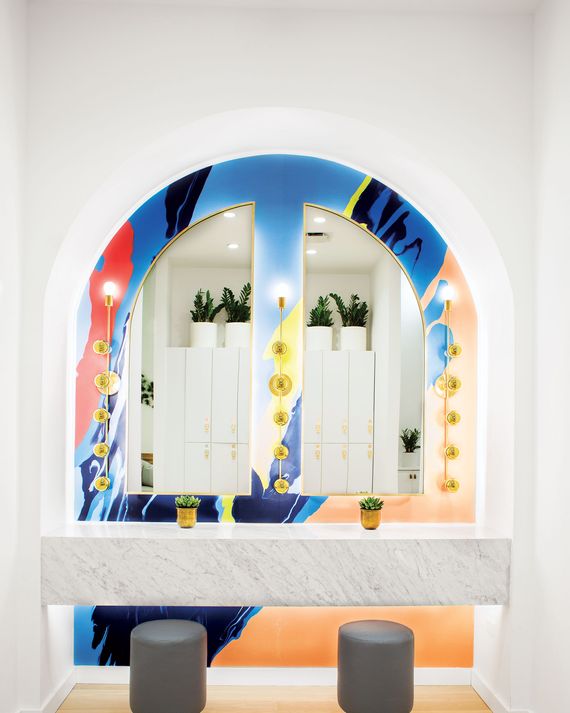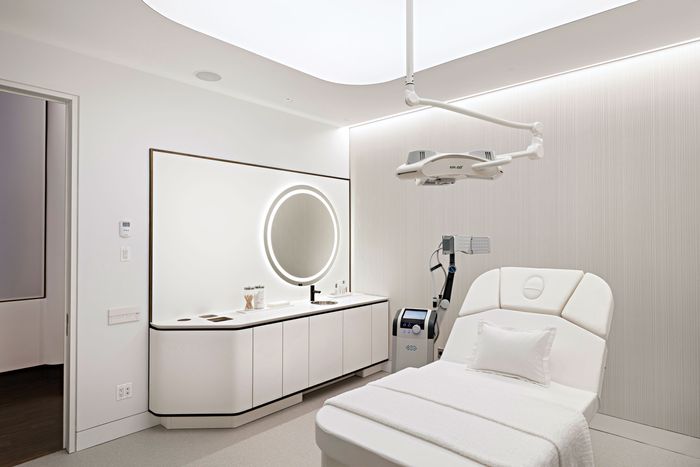
On a stretch of 18th Street near Fifth Avenue, between a SoulCycle and an Athleta store, sits Trellis, a storefront fertility center that could easily pass for a monstera-plant-adorned, natural-light-filled recycled-sneaker start-up. Or a monstera-plant-adorned, natural-light-filled on-the-go facial bar. Or a monstera-plant-adorned, natural-light-filled kickboxing gym. Trellis is not the first clinic of its kind. Over the past year, quite a number of medical start-ups resembling wellness studios have sprung up in New York: concierge doctors’ offices with white-oak floors instead of linoleum tiles, repackaged-for-2019 acupuncture clinics with vanity mirrors and bergamot spray in place of Buddha figurines and incense sticks, and a handful of places that serve as spa and doctor’s office both. This is happening, in part, thanks to the ever-ballooning wellness industry. But it’s also a direct result of New Yorkers’ getting more comfortable with the idea of popping into CityMDs for a sore throat on their way to the grocery store, instead of making an appointment with their internist. These new clinics all advertise futuristic treatments, easy-to-book appointments, and, most strikingly, a shared, decidedly unfusty aesthetic: Flimsy paper smocks are goners (Turkish bathrobes are the thing), floor-to-ceiling windows are a must, and industrial exam-room tables have been traded for velvet sofas. The doctor’s office, in other words, no longer looks much like a doctor’s office at all.
The Dover Street Market of Dermatology
The New York Dermatology Group (119 Fifth Ave.) — formerly a straightforward skin clinic — has opened an additional floor focused on integrating medical and holistic therapies with beauty procedures.
1. Emsculpt
An electromagnetic core-strengthening machine that, by stimulating the abdominal muscles, claims to do the equivalent of 20,000 sit-ups for you. Says founder Dr. David Colbert, “The Victoria’s Secret supermodels came and did it before the show.”
2. Cryotherapy Room
Two chambers that plunge to minus-220 degrees to boost collagen production; clients wear North Face bootees and soft cotton bathrobes.
3. IV Infusion Room
Offerings include intravenous and intramuscular vitamin therapies to address general well-being, adrenal chronic fatigue, focus and memory, hangovers, skin issues, and depression.
4. Retail
Floor-to-ceiling windows face Fifth Avenue, with over 100 different products from Colbert MD, Susanne Kaufmann, and Colorescience for sale.
5. Susanne Kaufmann
A space for the famous-in-Austria clinician, who staffed a team of specially trained aestheticians to offer two types of massages (herbal detox and body detox), plus four types of facials (including transformative, alkaline, and lymphatic).
6. Treatment Rooms
Eight of them, with quartz floors and interlocking fiberglass walls, where one can get a host of treatments, including five types of facials, lymphatic massages, a session in an infrared-light-therapy bed meant to relieve joint pain ($250), and body shaping via four different types of fat-reducing machines.
Acupuncture With Turkish Blankets
Two clinics intent on getting the woo-woo-averse in the door have just opened in New York.
Although acupuncture has become mainstream (many major insurance companies now cover the treatment), practices still tend to be tucked away on upper floors, without websites or a clear menu of treatment options and with a common, somewhat frayed-around-the-edges, ’90s-era hippie aesthetic. But in the past year, two sleek brands have arrived in New York. First there was Tribeca’s Common Point (3 Jay St.), a first-floor clinic with wood floors, lots of plants, and a waiting room decked out with Eames-ish chairs. The treatments are described in simple, easy-to-understand language: The “Restore” session ($70), for instance, is short and targets whatever part of the body is bothering the patient, while the “Deep Dive” ($130) offers an in-depth health evaluation and a personalized care plan. In November, WTHN — described by co-founder Dr. Shari Auth as “the SoulCycle of acupuncture” — opened in the Flatiron District (20 W. 22nd St.). Auth, like Common Point’s co-founder, Dr. Liz Carlson, insisted that the space be on the ground floor so passersby could peek in; she also decided to have clear, accessible menus explaining the benefits of each treatment, along with a space that felt upscale and spalike. Which explains the heated beds, Turkish towels, signature scent (it’s bergamot and frankincense, and it’s everywhere), and retail shop up front, which sells an immunity tonic ($19), a slumber-promoting serum ($22), and, of course, a jade face-roller ($30).
Members-Only Clubs (With Physicals and Philodendrons)
Membership-based medicine is not new. It started a decade ago, when private solo physicians in well-to-do enclaves began transitioning their practices to a concierge model, in which patients pay a monthly retainer for a bundle of services. But in the past couple of years, very modern, stylish concierge practices have come to New York. Though their offerings are extensive, none take health insurance — they’re meant to be used as supplementary care.
The Tech-y One
Forward, 555 Madison Ave.
The price: $149 a month.
The offerings: Unlimited office visits, specialized preventive visits, a personalized health plan, genetic testing, vaccines, and on-site blood work; access to a Forward-developed body scanner that takes detailed information about your weight, BMI, and other vitals; take-home devices related to your health concerns, like mini skin sensors for those at high risk of melanoma.
The aesthetic: Chrome walls and hardwood floors, blue mid-century-modern chairs, and nooks where patients can charge their phones and work on their laptops before appointments.
The extras: Lululemon tops and bottoms instead of paper smocks; an on-site pharmacy that stocks vitamins, drugs, health sensors, and S’well bottles.
The Holistic One
The Well, 2 E. 15th St. (opening this spring)
The price: $375 a month.
The offerings: Access to all sorts of treatments, such as reflexology, craniosacral therapy, and acupuncture facials; a yoga room and training gym; a dry sauna with charcoal-gray walls; a domed meditation room; monthly appointments with the Well’s slate of health-care providers, including internists for checkups and blood work, a licensed social worker, nutritionists, health coaches, and specialists like Keith Pyne (A-Rod’s guy).
The aesthetic: Whitewashed wood floors in the yoga room, teddy-bear chairs in the doctor’s suite, a greenhouse-inspired restaurant with turquoise walls, and live plants in every nook of the club.
The extras: A vegetable-centric restaurant by the founders of Cafe Clover with Ayurveda-inspired kitchari and spritzes on tap.
The Founded-by-a-Doctor One
Parsley Health, 126 Fifth Ave.
The price: $150 to $250 a month.
The offerings: One 75-minute appointment with a doctor that includes a full-body physical, a suggested fitness regimen, prescriptions for supplements, a food plan, and a litany of blood tests; over the course of the year, four additional appointments, five 45-minute visits with a health coach, and unlimited online access to your doctor via a messaging system for advice or refills; extensive blood work, including a genetic test to help patients understand what they’re susceptible to.
The aesthetic: About a Chair seats from Danish furniture line Hay, millennial-pink couches and light fixtures, a plant wall above the (curved concrete) check-in desk, and monstera plants in ceramic pots.
The extras: A café where members can order beverages like matcha lattes, valerian tea, and (on tap) celery-juniper kombucha.
If You’d Like Complimentary Celery Juice After Freezing Your Eggs
In November, Trellis, a fertility studio dubbed “the Equinox of egg freezing,” opened in the Flatiron District (7 W. 18th St.).
“The idea here was to create a really comfortable space where women could come for fertility treatment — everything from figuring out the best diet when you’re trying to get pregnant to the actual freezing of the eggs. We’ve done hundreds of blood tests already, which measure your AMH levels and tell you how many follicles are visible in your ovaries. We picked Flatiron because it’s central and also because of the brands in the area — SoulCycle, Bandier. They, like us, represent the modern woman. The design of the space was key: We have metallic wallpaper, an Instagram-friendly mural with a quote from Michelle Obama on it, a full juice bar. Plush couches, phone chargers everywhere, Turkish bathrobes instead of paper gowns. We get a weekly delivery of peach Juliet roses; there’s a bouquet in every room. And snacks — fertility-boosting, of course, like berries and salmon toasts. Plus, every room is named after an inspiring woman: Malala, Ellen. We want people to leave and talk about Trellis. Because everything is on social, except health care.” —Jennifer Huang, CMO
And the Big Hospitals Are Getting In on It Too
This winter, Mount Sinai is unveiling three major projects. The first, Lab100 (1468 Madison Ave.), is a clinic that, via a series of cutting-edge exams, aims to help patients understand eventual health risks. To give the space a futuristic look, Cactus, a firm that created interactive Nike stores and rooms in the Color Factory, was called on to design it. Next, Mount Sinai partnered with nonprofit Man Cave Health to open a practice (625 Madison Ave.) that offers prostate-cancer-related services in a space with mahogany walls and footballs signed by athletes like Joe Namath. And later this year, the hospital will open a clinic for residents of Hudson Yards (55 Hudson Yards) featuring marble countertops, plant walls, and giant windows overlooking the river.
*This article appears in the January 21, 2019, issue of New York Magazine. Subscribe Now!













